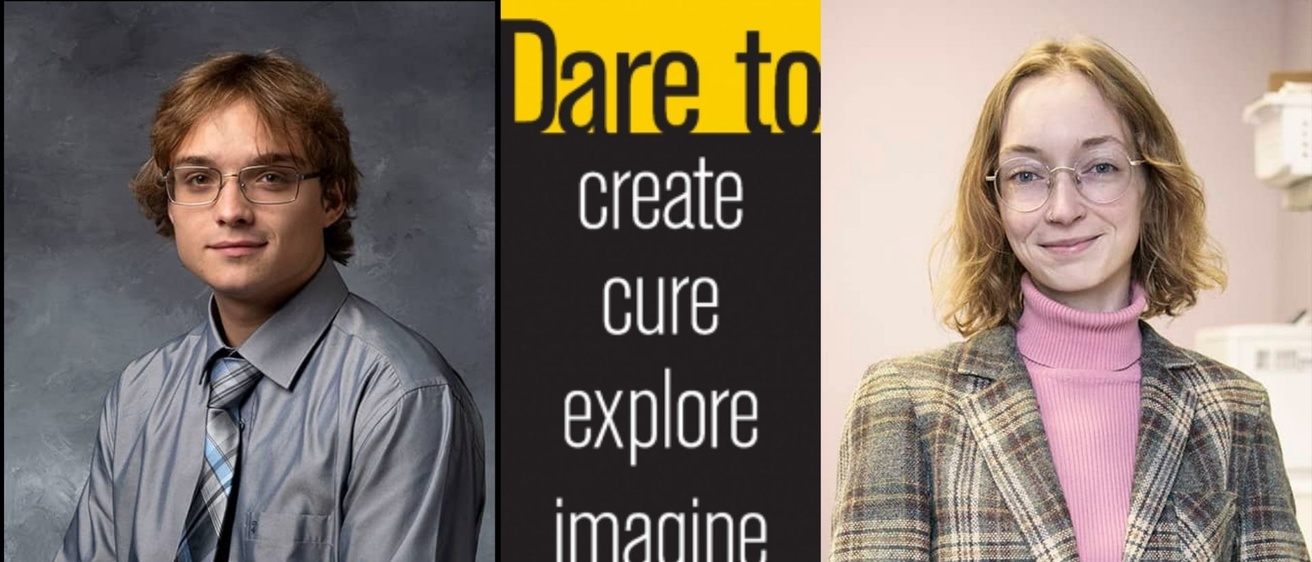Two Physics and Astronomy undergraduate students are featured in the 2022 University of Iowa Dare to Discover Campaign.
Joshua Doucette and Laura Weiler are among 82 UI undergraduates, graduate students, and postdoctoral researchers and scholars in the Dare to Discover campaign, sponsored by the Office of the Vice President for Research. The campaign showcases UI researchers, scholars, and creators on banners hung in downtown Iowa City from January to March 2022.
Student profiles:
Joshua Doucette, undergraduate student, Physics and Astronomy, Mathematics
Searches for dark matter
“Joshua is a very good scholar: curious, hard-working and intelligent. He bridges many interconnected areas both theoretically and experimentally, with a curiosity for both.” – Usha Mallik, Professor, Physics & Astronomy
• Hometown: Charles City, IA
• Faculty mentor/advisor: Professor Usha Mallik
• What is your degree program and expected graduate date? I am an undergraduate double majoring in Physics and Mathematics, with a minor in Computer Science. I plan to graduate at the end of the spring semester in 2022.
• Please describe your research: Our research group is driven to discover and understand particle physics beyond the standard model. I am currently involved in an ATLAS analysis, based on beyond the standard model physics, to search for Dark Matter production at the particle level. During the summer of 2021, I was involved with testing silicon strips and front end electronics at Brookhaven National Laboratory for the ATLAS detector upgrade, which will accompany the High Luminosity Large Hadron Collider upgrade at CERN in Geneva, Switzerland.
• In simple terms, why does this research matter? Our primary motivation for conducting this research is to extend the laws of physics to provide explanations for phenomena that remain unexplained. Using experiment as the judge of truth, we hope to revise the laws of physics so they no longer contain their current shortcomings and inadequacy. However, even if direct application of our research is not the primary motivation for our pursuit, historically major discoveries have happened along the way which have direct benefits for both industry and academia.
• How soon after starting at the University of Iowa were you able to participate in research? I was able to join the research community within my first semester at the University of Iowa.
• How has being involved in research made you more successful at the University of Iowa? In general, participating in research has helped me think more analytically and quantitatively. By doing research in experimental physics, I have learned that not everything works out the way you expect, and that it’s not always a bad idea to try again. I have also learned many skills while doing research that sometimes show up as requirements in my coursework.
• What are your career goals and/or plans after graduation? I hope to continue on to graduate school as a Ph.D. student in Physics and continue doing research.
Laura Weiler, undergraduate student, Physics, Computer Science
Explores A.I. for chemistry
“Laura is an undergraduate researcher in the field of theoretical chemistry. Her creativity and vision have helped us advance our fundamental understanding of how quantum mechanical interactions between electrons happen when they are a long way apart in materials.” – James Shepherd, Assistant Professor, Department of Chemistry
• Hometown: Atlanta, GA
• Faculty mentor/advisor: James Shepherd, PhD
• What is your degree program and expected graduate date? Physics B.S., Computer Science B.S., graduating May 2022
• Please describe your research: Quantum chemistry simulations of solids are prone to errors which arise from simulating real solids with a finite number of atoms. We use machine learning to understand these so-called finite-size errors in wavefunction-based quantum chemistry simulations. By better understanding finite-size errors, we can improve quantum simulations of solids.
• In simple terms, why does this research matter? The quantum mechanical description of solids is a large open question in science because it involves wavefunctions acting over large distances. Finite-size errors impede our ability to see these long-range quantum effects. Our contribution is to systematically remove finite-size errors in quantum chemistry methods. Without finite-size errors, wavefunction-based methods can be more widely adopted for applications such as catalysis and semiconductor design.
• How soon after starting at the University of Iowa were you able to participate in research? I began research the Spring of my Freshman year after being introduced to the Iowa Center for Research by Undergraduates (ICRU) page by my computer science professor.
• How has being involved in research made you more successful at the University of Iowa? Being involved in research has helped me create a support system at Iowa that has been very important to my success. I have worked with the Shepherd Group most of my undergraduate career, and over that time have benefitted from the support and advice of Professor Shepherd and his graduate students. Research has also given me the confidence as a student to engage deeply with my coursework and instructors.
• What are your career goals and/or plans after graduation? My work with the Chemistry department has inspired me to seek a Ph.D. in theoretical chemistry where I hope to continue research in electronic structure theory. After graduate school, I would like to become a professor of theoretical chemistry at an R1 university like the University of Iowa.
